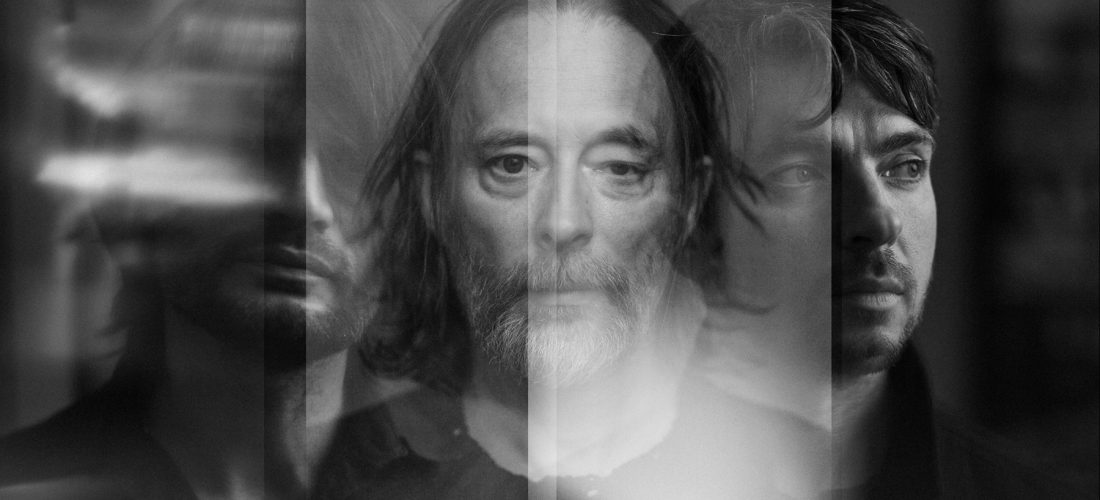Thom Yorke and Jonny Greenwood Go Off the Clock and Have a Good Time on the Smile’s Debut
Halfway through A Light for Attracting Attention, the Smile’s debut album, Thom Yorke flashes a smirk: “Don’t bore us, get to the chorus,” he drawls slowly almost without melody over ambient synths and downtempo piano on “Open the Floodgates.” Then he doubles down, whinging, “We want the good bits, without your bullshit, and no heartaches.” These lines are the sorts of gormless heckles he and fellow Smile member Jonny Greenwood have likely heard for decades in their other band, Radiohead, ever since they ventured into more experimental terrain on 1997’s OK Computer. But in the context of the Smile, Yorke’s words sound as sweet as they do ironic (there’s nary a chorus in sight), as Greenwood weaves echoey guitar textures around Yorke’s voice. It’s the two musicians’ version of punching out for the day and jamming.
The Smile emerged as Yorke and Greenwood’s Covid lockdown project, an opportunity to work on some tunes without all the pressure of being Radiohead’s Lennon and McCartney or, maybe more accurately, Waters and Gilmour — likely to the chagrin of group’s other three members, since A Light for Attracting Attention contains some of the songwriters’ most easily enjoyable music in years.
Although the duo hasn’t gone back to writing chorus-forward singles like “Creep” or “High and Dry” or attempted TikTok bids, the songs here feel more concrete than they have on recent Radioheadbangers like A Moon Shaped Pool or The King of Limbs. In addition to obvious shades of Radiohead, the album balances soundtrack composer Greenwood’s interests in contemporary classical music with Philip Glass–like minimalist piano motifs, as well as hints of complex King Crimson guitar lines, jazzy brass arrangements similar to David Bowie’s Blackstar, and motorik Krautrock rhythms rendered sideways by the Smile’s drummer, Tom Skinner, who plays regularly with the jazz group Sons of Kemet. The trio also recruited longtime Radiohead producer Nigel Godrich for the LP, which benefits from smart string and brass and woodwind arrangements.
Mostly, the album reflects Yorke’s lockdown anxieties with clever musical backdrops that never obscure the songs. “Free in the Knowledge,” the album’s most straightforward tune, juxtaposes verses about feeling “free in the knowledge that one day this will end” over David Gilmour–like acoustic strumming with a hopeful bridge section with shimmering strings over which Yorke sings, “I talked to the face in the mirror … I said it’s time that you deliver, we see through you.” It’s beautiful, affecting, and direct. Similarly, as “Waving a White Flag” grapples with lyrics like “couldn’t get a breath in” and “there has to be a way out,” a fuzzy synth does the heavy lifting with hopeful, comfortably numb chord changes. And on “The Opposite,” they play around with skittery drums, Robert Fripp–like miasmas of guitar, and vocal echoes as Yorke sings, “Can we have the next contestant please in this logical absurdity?”
As the record uncoils, you can practically hear how the songs become therapy for the musicians as they play around and work through their Covid cabin fever: Yorke commands a surprisingly funky bass riff throughout “The Smoke,” the trio jams in the mind-bending time signature 7/8 on “Pana-Vision,” and Greenwood attempts some elastic guitar lines over skittish percussion on “A Hairdryer.” By lowering the stakes for themselves, Yorke and Greenwood sound like they’ve been set free, unencumbered by out-arting themselves, a lesson that they’d be smart to bring back to their main gig. Yorke and Greenwood have known for years that they don’t need a chorus and there’s still plenty of good bits; the Smile is an opportunity for fickle listeners to catch up.
